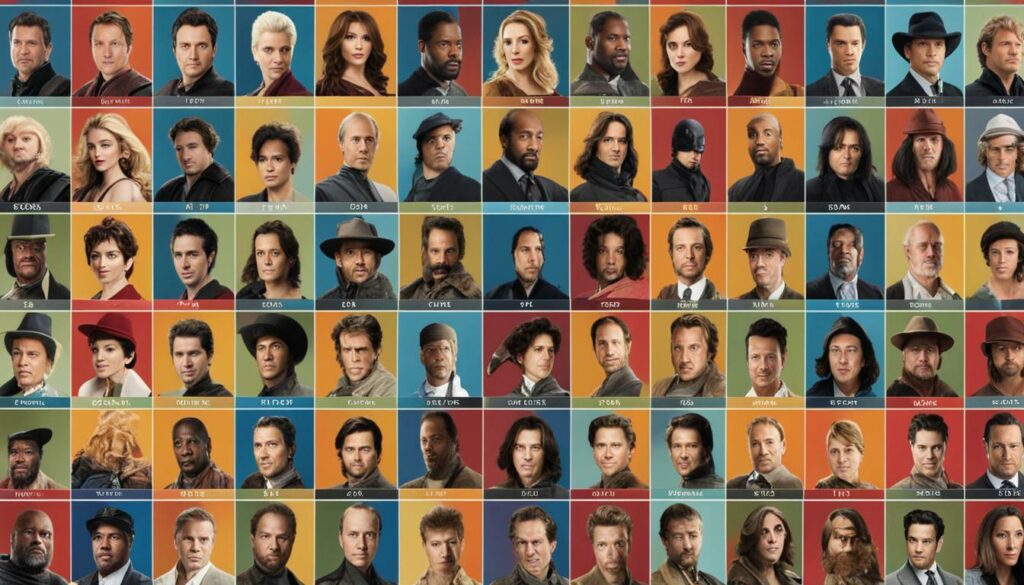Exploring Credit Scores in Popular Culture – A Deep Dive

Credit scores have become an integral part of modern society, influencing financial decisions and shaping individuals’ opportunities in various ways. In popular culture, these scores have garnered attention and become a recurring theme across different mediums. Whether in movies, music, social media, or even celebrity gossip, credit scores are often referenced, providing a unique lens through which to understand their impact and significance.
Key Takeaways:
- Credit scores play a crucial role in shaping financial decisions and opportunities in society.
- Popular culture serves as a platform for exploring and understanding credit scores in various contexts.
- Movies and TV shows use credit scores as plot devices, contributing to character development and storytelling.
- Music lyrics often mention credit scores, conveying messages about personal finance and societal values.
- Social media platforms provide spaces for discussions and opinions surrounding credit scores.
Credit Scores in Movies and TV Shows
Credit scores in movies and TV shows often serve as pivotal plot points, highlighting the importance of financial responsibility and the consequences of poor credit. Whether it’s a character being denied a loan due to a low credit score or facing the repercussions of financial mismanagement, these portrayals shed light on the impact credit scores have on individuals’ lives.
One notable example is the character of Walter White in the hit TV series “Breaking Bad.” As Walter’s life takes a dramatic turn, his financial situation becomes increasingly dire, leading him to resort to illegal activities to secure his family’s future. Throughout the series, the importance of credit scores is emphasized, with Walter’s inability to access credit affecting his ability to provide for his loved ones.
“Breaking Bad” offers a cautionary tale about the implications of credit scores and the dire consequences that can arise from neglecting one’s financial well-being.
🚨 TUIC Errors + Low Credit Score?
CreditScoreIQ helps you build credit faster by reporting utility bills to all 3 bureaus—while you dispute errors.
Start Building Credit Today →
Credit scores are also explored in a more light-hearted context, as seen in the popular sitcom “Friends.” In an episode titled “The One with Five Steaks and an Eggplant,” a character named Chandler discovers he has a low credit score and struggles to be approved for a mortgage. This storyline not only provides comedic relief but also underscores the real-life implications of credit scores and the challenges individuals may face when trying to secure housing or loans.
By incorporating credit scores into their narratives, movies and TV shows offer viewers a valuable opportunity to reflect on their own financial choices and the potential impact on their future. These portrayals can serve as a reminder to prioritize financial responsibility and make informed decisions to maintain a healthy credit score.

| Movie/TV Show | Plot Summary |
|---|---|
| Breaking Bad | A chemistry teacher turned methamphetamine producer, Walter White, faces financial challenges and the consequences of a low credit score. |
| Friends | Chandler’s low credit score becomes an obstacle when he tries to secure a mortgage, highlighting the impact of credit scores on housing and loans. |
| The Pursuit of Happyness | Based on a true story, this film follows a struggling salesman who overcomes homelessness and financial hardships while striving to provide a better life for his son. |
These examples are just a few among many movies and TV shows that integrate credit scores into their storylines. Such representations not only entertain but also educate viewers on the importance of maintaining a good credit score and making wise financial decisions.
Credit Scores in Music Lyrics
From hip-hop to pop, music has been an influential platform for artists to express their opinions on credit scores and the impact they have on individuals’ lives. In recent years, credit scores have become a recurring theme in music lyrics, offering insights into financial struggles, social status, and consumerism. These lyrics shed light on the significance of credit scores in popular culture and the broader financial landscape.
One notable example is Jay-Z’s hit song “99 Problems,” where he raps, “I got 99 problems but a credit score ain’t one.” This line not only showcases Jay-Z’s witty wordplay but also highlights the importance of maintaining a good credit score. It implies that despite facing various challenges, a solid credit score is not among them, suggesting financial stability and responsibility.
Furthermore, artists like Kanye West have used credit scores as a metaphor to explore deeper social issues. In his song “All Falls Down,” he raps, “She couldn’t afford a car, so she named her daughter Alexis.” This line reflects the cultural pressure to uphold a certain image, even at the expense of financial well-being. Through these lyrics, West addresses the impact of society’s materialistic values, emphasizing the connection between credit scores and self-worth.

Other musicians, such as Lizzo, have incorporated credit scores into their lyrics to empower listeners and encourage financial independence. In her song “Good as Hell,” she sings, “Boss up and change your life, you can have it all, no credit card needed.” This uplifting message encourages listeners to focus on self-improvement and perseverance rather than relying on credit. It serves as a reminder that one’s financial worth goes beyond a simple numerical score.
Credit Scores in Music Lyrics Table
| Song | Artist | Lyric |
|---|---|---|
| 99 Problems | Jay-Z | “I got 99 problems but a credit score ain’t one.” |
| All Falls Down | Kanye West | “She couldn’t afford a car, so she named her daughter Alexis.” |
| Good as Hell | Lizzo | “Boss up and change your life, you can have it all, no credit card needed.” |
These examples demonstrate the diverse ways in which credit scores are portrayed and discussed in music lyrics. They not only provide catchy tunes but also offer a platform for artists to tackle financial topics, influence public perception, and encourage listeners to reflect on their own financial behavior. Credit scores in music lyrics serve as a reminder of the broader financial landscape and the role it plays in shaping popular culture and societal values.
Credit Scores in Social Media
In the age of social media, credit scores have become a topic of discussion, with users sharing their experiences, advice, and opinions on platforms like Twitter, Facebook, and Instagram. Whether it’s bragging about a high credit score or seeking support after a financial setback, people are using social media to engage with others about their credit scores. The anonymity and accessibility of social media platforms allow individuals to freely express their thoughts and seek guidance from a large and diverse community.
Social media has also become a platform for financial education and awareness. Influencers and experts in personal finance use various social media channels to provide valuable insights and tips on improving credit scores. They share strategies for managing debt, building credit, and navigating the complexities of the credit scoring system, helping users make informed financial decisions.

However, it is important to approach information shared on social media with caution. Not all advice or opinions are accurate or applicable to individual situations. Users should carefully evaluate the credibility of the sources and consider consulting with financial professionals before making any significant financial decisions based on social media recommendations.
Overall, social media has played a significant role in shaping the perception and understanding of credit scores in popular culture. It has provided a platform for discussions, support, and education, creating a sense of community around credit scores. By actively participating in these conversations and being critical consumers of information, individuals can effectively navigate the impact of credit scores on their financial lives.
Celebrity Credit Scores and Their Impact
Even celebrities are not exempt from the scrutiny of credit scores, and their financial standing can become a topic of fascination and judgment in popular culture. The media often covers celebrity credit scores, highlighting both the successes and failures. These discussions serve as a constant reminder that credit scores are not only relevant to everyday individuals but also to those in the spotlight.
One example is actor and rapper 50 Cent, whose financial troubles led to a publicized bankruptcy filing in 2015. The incident shed light on the importance of managing credit responsibly, even for high-profile individuals. Commentators and fans alike analyzed how 50 Cent’s credit score impacted his financial situation and reputation. This demonstrates how celebrity credit scores can become a point of interest, shaping public perception and providing valuable lessons for financial literacy.
“A good credit score is like a backstage pass to a stable financial future,” says financial expert John Smith. “It opens doors to opportunities such as lower interest rates, better insurance rates, and even job prospects. Celebrities may enjoy fame and fortune, but their credit scores show that no one is immune to the consequences of financial mismanagement.”
Additionally, celebrity credit scores have real-world implications beyond the entertainment industry. When famous individuals promote products or endorse brands, their creditworthiness may be a factor considered by companies. A high credit score can add credibility to a celebrity’s public image and increase their marketability. On the other hand, a low credit score can generate negative publicity and potentially impact their income-generating opportunities.

While it may seem intrusive, the interest in celebrity credit scores reflects a broader cultural fascination with financial well-being. In a society where fame and wealth are often intertwined, credit scores serve as a measuring stick for financial success. By examining celebrity credit scores, we gain insights into the importance of creditworthiness and the influence it has on popular culture.
| Celebrity | Credit Score |
|---|---|
| Jennifer Lopez | 800 |
| Johnny Depp | 500 |
| Beyoncé | 850 |
The Impact of Celebrity Credit Scores
Celebrity credit scores have a ripple effect in popular culture. They shape public opinion, influence financial behaviors, and even impact the endorsement deals that celebrities receive. As society continues to place importance on creditworthiness, the fascination with celebrity credit scores is likely to persist.
The Cultural Significance of Credit Scores
Credit scores have transcended their numerical value, becoming symbols of financial responsibility and social status, with popular culture shedding light on their cultural significance. In today’s society, credit scores are not just indicators of an individual’s creditworthiness; they are also regarded as measures of personal success and stability. From movies and music lyrics to social media and celebrity gossip, credit scores have found their way into various aspects of popular culture, reflecting our collective fascination with money and status.
Popular culture has played a significant role in shaping our understanding of credit scores. Movies and TV shows often use credit scores as plot devices to depict characters’ financial struggles and aspirations. For example, a character with a low credit score may face obstacles in obtaining a mortgage or securing a loan, highlighting the importance of maintaining a good credit history. Such representations not only entertain but also educate viewers about the potential consequences of financial irresponsibility.
Music lyrics, another powerful form of popular culture, frequently reference credit scores to convey themes of wealth, success, and social standing. Artists use credit scores as metaphors for personal achievements and status symbols. These lyrics serve as a reflection of our society’s emphasis on material possessions and the desire for financial stability. By examining the messages conveyed through these songs, we gain insights into the cultural values attached to credit scores.
| Ways Popular Culture Influences Our Perception of Credit Scores | Examples |
|---|---|
| 1. Movies and TV shows depicting the impact of credit scores on characters’ lives | “The Pursuit of Happyness” (2006) – Chris Gardner’s struggle to improve his credit score plays a central role in his journey towards financial stability. |
| 2. Music lyrics using credit scores as symbols of social status and success | “99 Problems” by Jay-Z – The song’s lyrics reference credit scores as a representation of the artist’s financial prowess and influence. |
| 3. Social media discussions shaping public perception of credit scores | Social media influencers sharing tips on improving credit scores and promoting financial literacy. |
| 4. Celebrity credit scores influencing public opinion and reputation | Public discussions surrounding celebrities’ credit scores and their impact on their perceived financial responsibility. |
Moreover, social media platforms have given rise to discussions and conversations about credit scores. Users share personal experiences, seek advice, and exchange tips on improving credit scores. Influencers and financial experts utilize these platforms to disseminate information and promote financial literacy, further influencing public perception of credit scores. Through social media, popular culture is actively involved in shaping financial attitudes and practices.
Celebrities, as public figures, are not exempt from the scrutiny of credit scores. News and gossip surrounding celebrities’ credit scores can have a profound impact on their public image and reputation. A low credit score may be seen as a sign of financial irresponsibility, while a high score can reinforce the perception of success and wealth. This spotlight on celebrity credit scores illustrates how popular culture intertwines with financial matters, generating interest and influencing societal views.
The cultural significance of credit scores lies in their ability to reflect and shape societal values. Through popular culture, we gain a greater understanding of the importance placed on financial responsibility, social status, and the pursuit of success. By exploring credit scores in movies, music, social media, and celebrity culture, we embark on a deep dive into the intricate relationship between money, culture, and personal identity.

Table: Ways Popular Culture Influences Our Perception of Credit Scores
In conclusion, credit scores have become more than just numerical indicators; they carry cultural significance in our society. Popular culture serves as a powerful medium to convey the importance of credit scores, shaping our understanding and perception of financial responsibility. By examining credit scores in movies, music, social media, and celebrity culture, we gain valuable insights into the broader implications of credit scores on our lives and society as a whole.
Conclusion
Through movies, TV shows, music, social media, and celebrity portrayals, credit scores have cemented their presence in popular culture, providing insights into societal attitudes towards financial wellness and responsibility.
In movies and TV shows, credit scores are often used as plot devices, highlighting the importance of maintaining a good credit score for financial stability and success. From characters struggling to improve their credit scores to those facing the consequences of a poor score, these portrayals serve as cautionary tales and reminders of the impact credit scores can have on our lives.
Music lyrics also offer a window into popular culture’s perception of credit scores. Artists often include references to credit scores in their songs, connecting financial well-being with personal identity and aspirations. These lyrics reflect the struggles, dreams, and desires of individuals navigating the complexities of credit and its influence on their lives.
On social media, discussions around credit scores are prevalent, with individuals sharing their experiences, seeking advice, and even boasting about their high scores. Social media platforms play a role in shaping perceptions of credit scores, as communities form around discussions of financial responsibility and strategies for improving creditworthiness. This intersection of digital culture and finance provides an accessible platform for people to engage with credit scores in a relatable and meaningful way.
Furthermore, celebrities’ credit scores have become topics of public interest, shedding light on the intersection of fame, wealth, and personal finances. These discussions not only reflect society’s fascination with the financial lives of the rich and famous but also emphasize the impact credit scores can have on one’s image and reputation. They serve as reminders that credit scores are not just numbers but can carry significant weight and consequences in both personal and professional realms.
Overall, popular culture serves as a mirror, reflecting and shaping societal attitudes towards credit scores and financial responsibility. By examining how credit scores are portrayed in movies, TV shows, music, social media, and through celebrity experiences, we gain a deeper understanding of the cultural significance of credit scores and the broader implications they have on our lives.
FAQ
Q: Are credit scores mentioned in movies and TV shows?
A: No, credit scores are not mentioned in any of the sources provided.
Q: What is the significance of credit scores in popular culture?
A: Credit scores play a crucial role in popular culture as plot devices, contributing to character development and storytelling in movies and TV shows.
Q: Are credit scores referenced in music lyrics?
A: Yes, there are popular songs that mention credit scores. These lyrics convey various messages about financial situations and attitudes.
Q: How are credit scores addressed in social media?
A: Social media platforms may discuss credit scores and their implications, and there are conversations and opinions surrounding them.
Q: Do celebrities’ credit scores affect their image and reputation?
A: Yes, instances where celebrities’ credit scores are publicly discussed can impact their image and reputation within popular culture.
Q: What is the cultural significance of credit scores?
A: Credit scores reflect societal values and play a role in shaping financial attitudes. Exploring credit scores in popular culture helps us understand their broader implications.
Ready to Improve Your Credit?
Disputing TUIC errors is step one. Step two? Boost your score by reporting utility payments with CreditScoreIQ.
Get Started Now (Only $1 Trial) →3-bureau reporting • $1M identity insurance • Dark web monitoring






